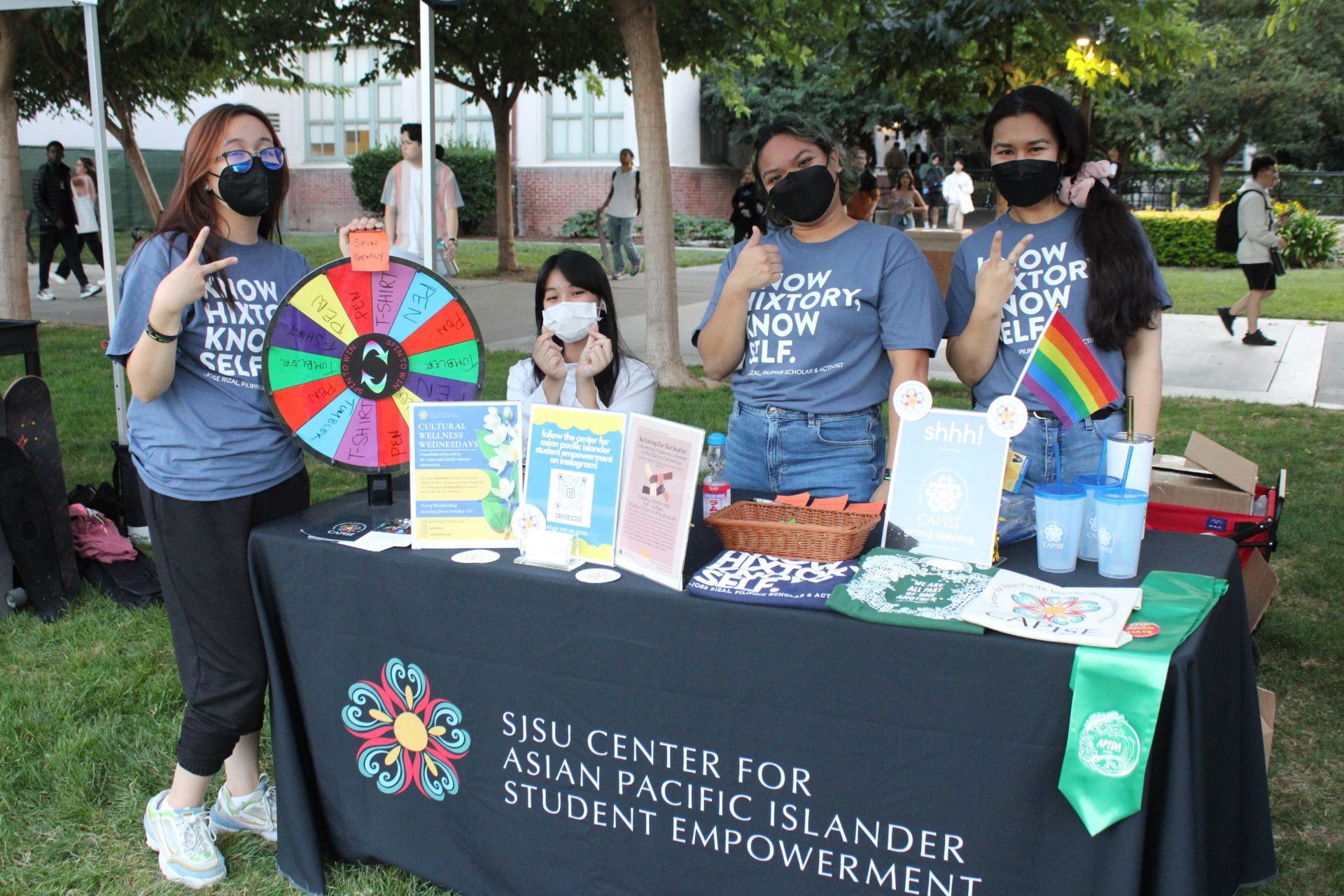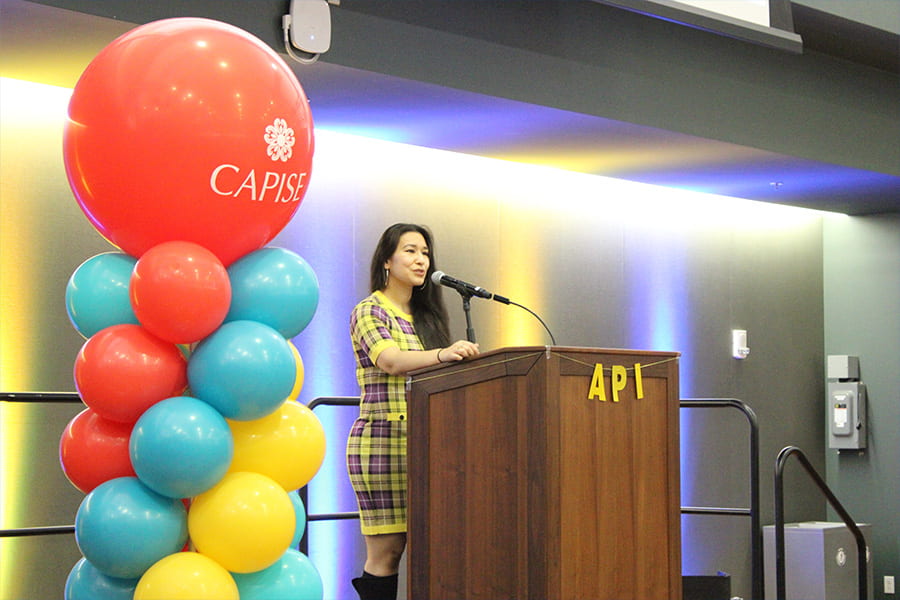Deep Dive in Five with Jinni Pradhan of CAPISE

Members of SJSU’s Center for Asian Pacific Islander Student Empowerment tabled at the Rooted: Social Justice Music and Arts Festival hosted by the César Chávez Community Action Center. From left to right: Kayla Le, ’25 Forensic Biology; Evelyn Ngo, ’25 Marketing; Arianna Nicole Orsua, ’25 Sociology, and CAPISE Director Jinni Pradhan. Photo by CAPISE, Archit Mahale, ’24 History.
Words matter, says Jinni Pradhan, inaugural director of San José State University’s Center for Asian Pacific Islander Student Empowerment (CAPISE). Words, especially the ones people use to identify themselves, their cultures or their communities, help shape identity, which often leads to belonging. She adds that for years, San José State students who identified as Asian and Pacific Islander felt they didn’t have a dedicated space on campus to call their own, which is why CAPISE is so essential.
Founded in early 2022 and officially open as of last November, CAPISE offers a place for all Spartans, especially Asian and Pacific Islander students, to access academic, cultural and social resources; to connect with a greater community of students, staff and faculty; and to participate in events designed to spark conversation.
This April, CAPISE partnered with the Mosaic Cross Cultural Center, the Asian American Studies program, Counseling and Psychological Services, Student Affairs, Campus Life, the Student Union, Inc., and other groups to offer a wide variety of programs in honor of Asian Pacific Islander Heritage Month. Though the heritage month is recognized nationally in May, CAPISE kicks off events in April to ensure that students can fully participate before finals and commencement.
Pradhan answered a few questions about API Heritage Month and CAPISE in this latest installment of the Deep Dive in Five.
Tell us more about CAPISE. What does it offer SJSU students?
Jinni Pradhan (JP): I was hired in February 2022 as the inaugural director of the center to help build it from the ground up. Before I came, we had a task force for our API community, where staff, faculty and students worked together to provide a framework for the center. Between 40–45% of our SJSU student population identifies as Asian or Pacific Islander. When I arrived, I was on the ground talking to students, asking them what they wanted, and one of the major responses I got was we need visibility on campus.
Many students said, yes, we’re a large part of the population, but we don’t feel seen and we don’t feel like we have a space for ourselves. This issue of visibility is not specific to SJSU, either. I think in the popular imagination in the United States, we’re not really seen beyond certain stereotypes.
That is beginning to change, but we have a long way to go, as we are an incredibly diverse community. Asia alone extends from Iran and Iraq all the way to Japan, and all the way south to Indonesia and India. The Pacific Islands extend us even further. It includes so many cultures, so many heritages and histories.
Now that we have a dedicated space in the Student Union, students, staff and faculty can come to a place that feels like home.
Tell us about API Heritage Month this year.
JP: The theme for API Heritage Month this year is the arts. With “Everything Everywhere All At Once” sweeping the Oscars, an indie film about an intergenerational relationship between a mother and daughter reflecting the immigrant experience told from an Asian perspective, it’s been exciting to see our stories brought to the screen. The new Netflix series “Beef” is another story that really highlights another aspect of the Asian American experience.
We’ve collaborated with Student Involvement to put on the Night Market, a tradition with roots in the Asian Pacific Islander community in the United States. We involved the Student Union and Associated Students and many other great collaborators, and lots of students came out. It was really wonderful to see how much they enjoyed having that space.
We kicked off the month with a panel called “What’s in a Name?” that discussed various terms that people use to describe and relate to the Asian Pacific Islander community. We wanted to provide some educational focus on campus to bring perspective as to why we use terms like API.
Why is it important to recognize API Heritage Month?
JP: API Heritage Month is a time for us to visibilize and uplift our Asian and Pacific Islander community — not just through programs and events, but resources too. If you work on campus, what you do impacts students. So it’s important to know the resources, or at least be aware that they exist, because you never know when you’re going to interact with someone who needs a space where they want to connect or find community.
It’s important to share that we have a web presence, that we can be found on social media, and that there are many ways to connect with the API community. Even if you don’t identify as Asian or Pacific Islander yourself, it’s important to know that resources like CAPISE, the Black Leadership Opportunity Center (BLOC) and the Chicanx/Latinx Student Success Center (Centro) exist, because that’s what it means to be in community. Understand and get to know other people. Experience our histories and maybe engage in our activities so you can also celebrate us. Stand in solidarity, yes, but also learn and show up for folks not just when it’s hard, but in our celebratory moments as well.
What does API Heritage Month mean to you?
JP: I identify as a second-generation Nepali American. My parents immigrated to the Bay Area from Nepal in the 1980s. A lot of our students are also second-generation. Their parents are immigrants. I share that experience, plus I grew up in the Bay Area.
Despite this, I didn’t grow up celebrating API Heritage Month. It wasn’t until I started working in Student Affairs that I really understood what it means. It sounds funny, but I am always Asian. While we celebrate our heritage this month, we are also always celebrating our heritage. This is a chance to really uplift and visualize our larger communities. This month offers the chance for us to invite other folks into the conversation, do more intentional cross-community conversations, even across our ethnic communities within the umbrella of Asian Pacific Islander.
How can SJSU community members get involved with CAPISE?
JP: We are still a small and mighty team, and we’re trying to build our capacity. We have a student assistant staff that helps run our center and manage outreach. We also run a mentorship program similar to Centro and BLOC, where first-year students can be paired with student mentors. So one of the major ways to get involved is to get employed by us.
We also have an API resource library, a small but growing library where students can check out books related to the Asian and Pacific Islander community. We have fiction, nonfiction, poetry, graphic novels, all about the API experience and history. That library is special because you can’t go into the Dr. Martin Luther King, Jr. Library and see all the books we have on the same shelf. Community members can engage with our library, but help us build it up as a growing resource as well.
Anyone can get involved by simply walking in the door and deciding how they want to engage. We have a lot of resources and materials for other events that we can recommend. While our resources are geared toward Asian and Pacific Islander communities, any student or staff member is welcome to come in, as long as they engage respectfully.





